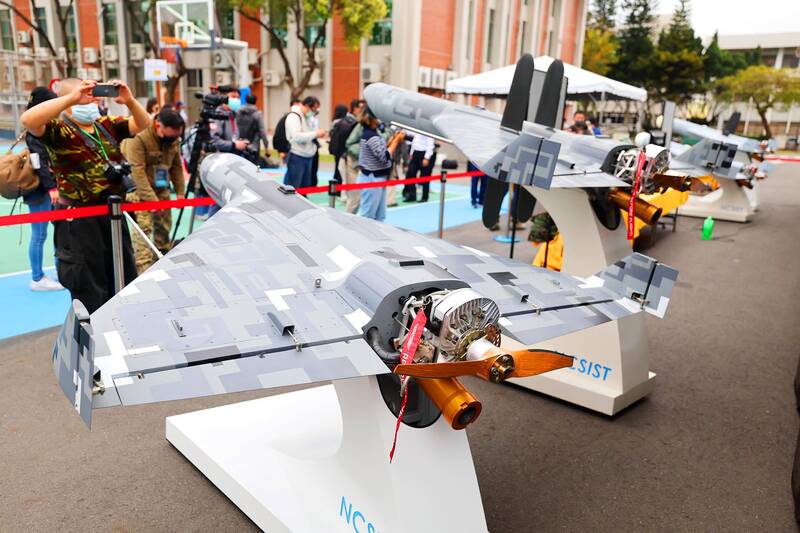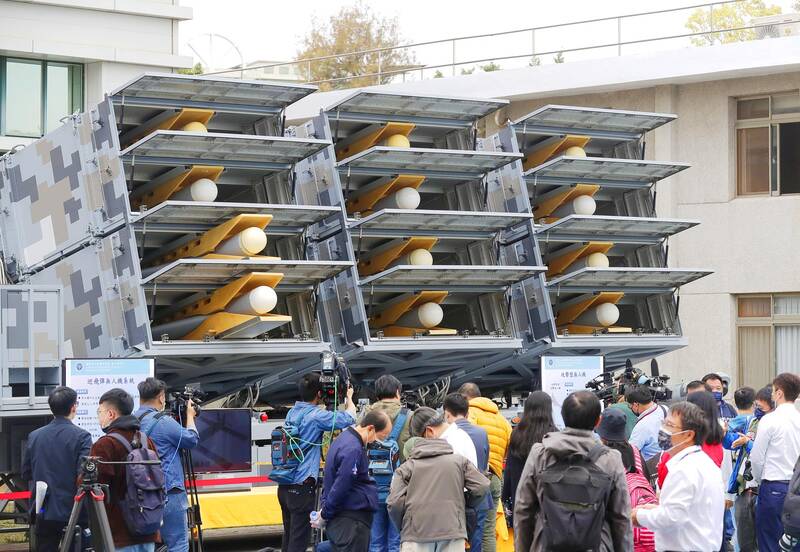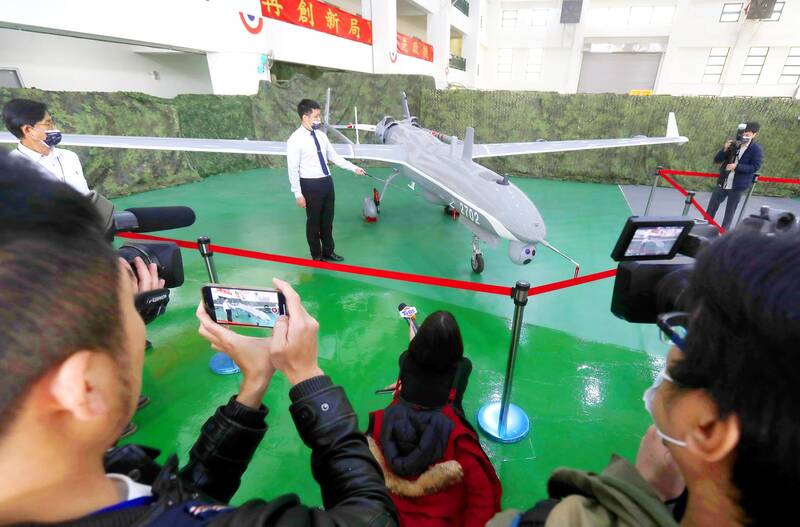Taiwan’s top military research body yesterday unveiled nine domestically developed drones in Taichung, including a loitering munition, or “suicide drone,” similar to the US-made AeroVironment Switchblade 300.
The surveillance and attack drones shown to the media by the Chungshan Institute of Science and Technology included the Albatross medium-range uncrewed aerial vehicle Nos. 1 and 2, and the Teng Yun 2 and Cardinal 2 and 3 indigenous uncrewed combat aerial vehicles.
The institute also unveiled a domestically made drone inspired by the AeroVironment Switchblade 300, which Ukrainian forces have employed in the country’s war with Russia.

Photo: CNA
Aeronautical Systems Research Division head Chi Li-pin (齊立平) told reporters that the miniature loitering munition has a range of 10km, can fly for 15 minutes and can fit inside a rucksack.
The device, which has a high-performance electro-optical and infrared sensor, can be carried by a single soldier and can destroy high-value, high-risk vehicles as well as target personnel, Chi said.
“It is like a large grenade capable of flying,” Chi said.

Photo: Chiang Ying-ying, AP
The “suicide” drone would be well suited for attacking coastal and near-shore enemy targets, he said, adding that it was compatible with Taiwan’s military needs with regards to conducting asymmetrical warfare against a much stronger rival.
Institute president Art Chang (張忠誠) said that the war in Ukraine had focused attention on drones and his institution has teamed up with Taiwanese companies to build a “national team” to develop military drones.
The military has announced a partnership with companies aimed at producing 3,000 drones next year.

Photo: Chiang Ying-ying, AP
Separately yesterday, Minister of National Defense Chiu Kuo-cheng (邱國正) said that the military would adjust its deployments in Kinmen County amid security concerns after a missing soldier was later confirmed alive in China.
Chiu made the comment on the sidelines of a legislative session while discussing the case of a private first class surnamed Chen (陳), who was confirmed by the government to be safe in China’s Xiamen after disappearing on Thursday last week.
Chen was reported missing from Erdan (二膽), a small islet in Kinmen less than 5km from Xiamen.
Asked if the military was worried that Chen’s presence in China could pose a security risk, Chiu said that the private’s access to confidential information was irrelevant because the military was going to take precautions one way or the other.
“We will make adjustments [concerning troop deployments] as we conduct a regular review of our deployments,” he said.
Despite widespread speculation over what happened and why Chen would leave Erdan, including that he might have fled to escape debts, no clear explanation of the case has been provided.
Asked why Chen left his post, Chiu had little to offer yesterday other than saying an investigation had not found that the soldier had disputes with superior officers before going missing.
Responding to a Reuters report the day before about a sharp increase in British exports of submarine parts to Taiwan, Chiu declined to comment directly, saying that the domestic submarine program faces many difficulties, but is going according to plan.
Additional reporting by Reuters

Conflict with Taiwan could leave China with “massive economic disruption, catastrophic military losses, significant social unrest, and devastating sanctions,” a US think tank said in a report released on Monday. The German Marshall Fund released a report titled If China Attacks Taiwan: The Consequences for China of “Minor Conflict” and “Major War” Scenarios. The report details the “massive” economic, military, social and international costs to China in the event of a minor conflict or major war with Taiwan, estimating that the Chinese People’s Liberation Army (PLA) could sustain losses of more than half of its active-duty ground forces, including 100,000 troops. Understanding Chinese

The Ministry of Foreign Affairs (MOFA) yesterday said it is closely monitoring developments in Venezuela, and would continue to cooperate with democratic allies and work together for regional and global security, stability, and prosperity. The remarks came after the US on Saturday launched a series of airstrikes in Venezuela and kidnapped Venezuelan President Nicolas Maduro, who was later flown to New York along with his wife. The pair face US charges related to drug trafficking and alleged cooperation with gangs designated as terrorist organizations. Maduro has denied the allegations. The ministry said that it is closely monitoring the political and economic situation

‘SLICING METHOD’: In the event of a blockade, the China Coast Guard would intercept Taiwanese ships while its navy would seek to deter foreign intervention China’s military drills around Taiwan this week signaled potential strategies to cut the nation off from energy supplies and foreign military assistance, a US think tank report said. The Chinese People’s Liberation Army (PLA) conducted what it called “Justice Mission 2025” exercises from Monday to Tuesday in five maritime zones and airspace around Taiwan, calling them a warning to “Taiwanese independence” forces. In a report released on Wednesday, the Institute for the Study of War said the exercises effectively simulated blocking shipping routes to major port cities, including Kaohsiung, Keelung and Hualien. Taiwan would be highly vulnerable under such a blockade, because it

UNRELENTING: China attempted cyberattacks on Taiwan’s critical infrastructure 2.63 million times per day last year, up from 1.23 million in 2023, the NSB said China’s cyberarmy has long engaged in cyberattacks against Taiwan’s critical infrastructure, employing diverse and evolving tactics, the National Security Bureau (NSB) said yesterday, adding that cyberattacks on critical energy infrastructure last year increased 10-fold compared with the previous year. The NSB yesterday released a report titled Analysis on China’s Cyber Threats to Taiwan’s Critical Infrastructure in 2025, outlining the number of cyberattacks, major tactics and hacker groups. Taiwan’s national intelligence community identified a large number of cybersecurity incidents last year, the bureau said in a statement. China’s cyberarmy last year launched an average of 2.63 million intrusion attempts per day targeting Taiwan’s critical